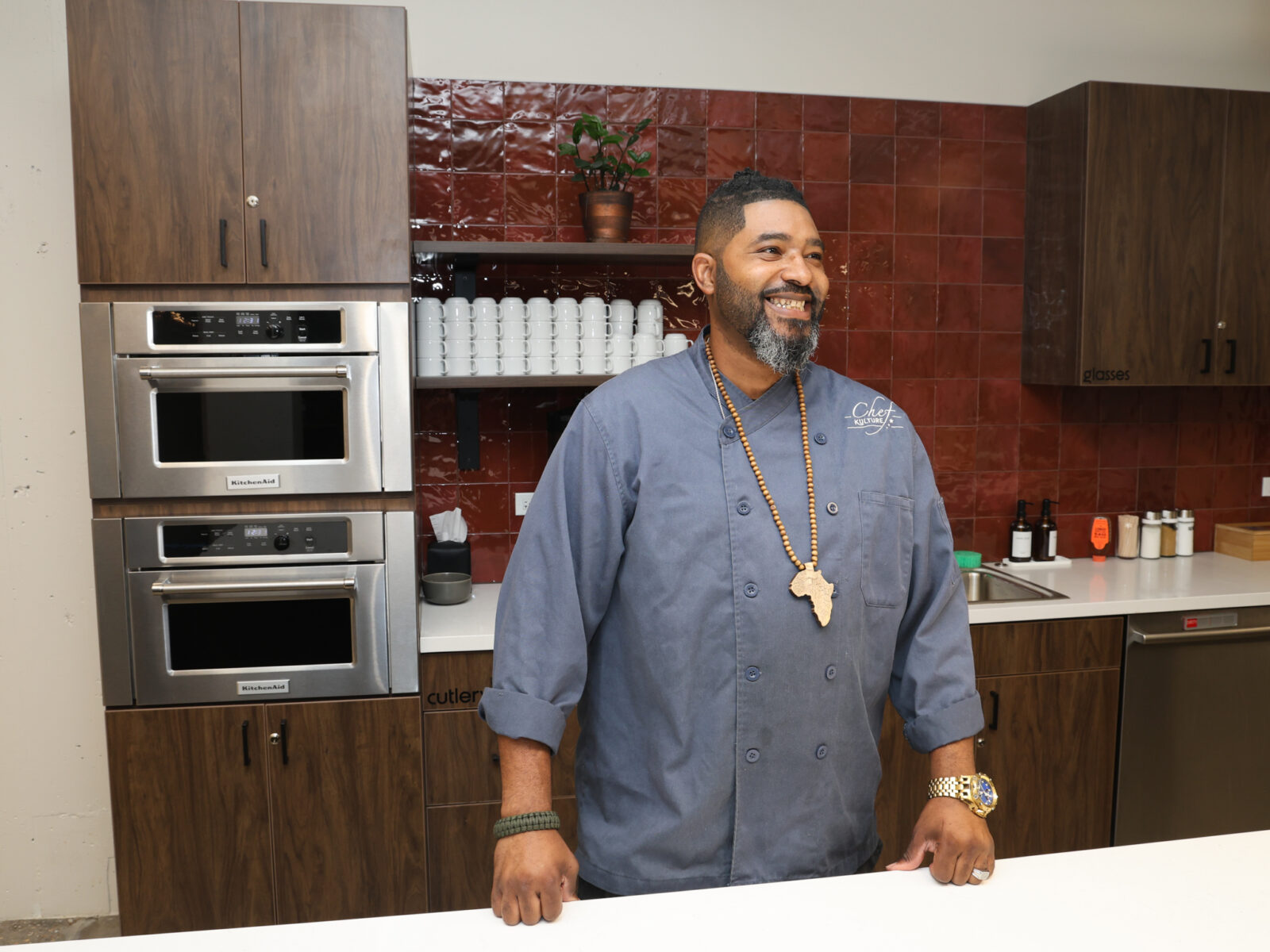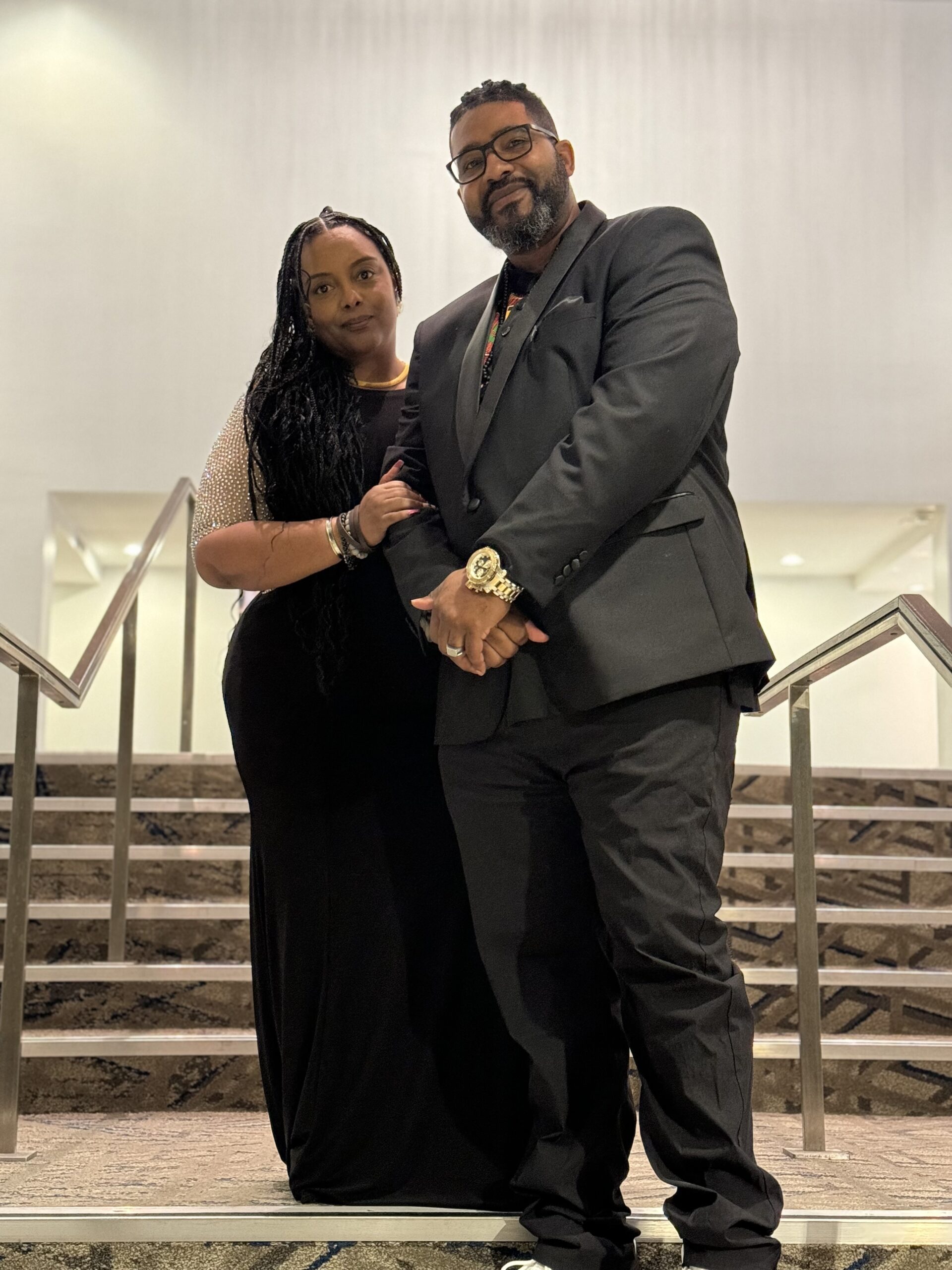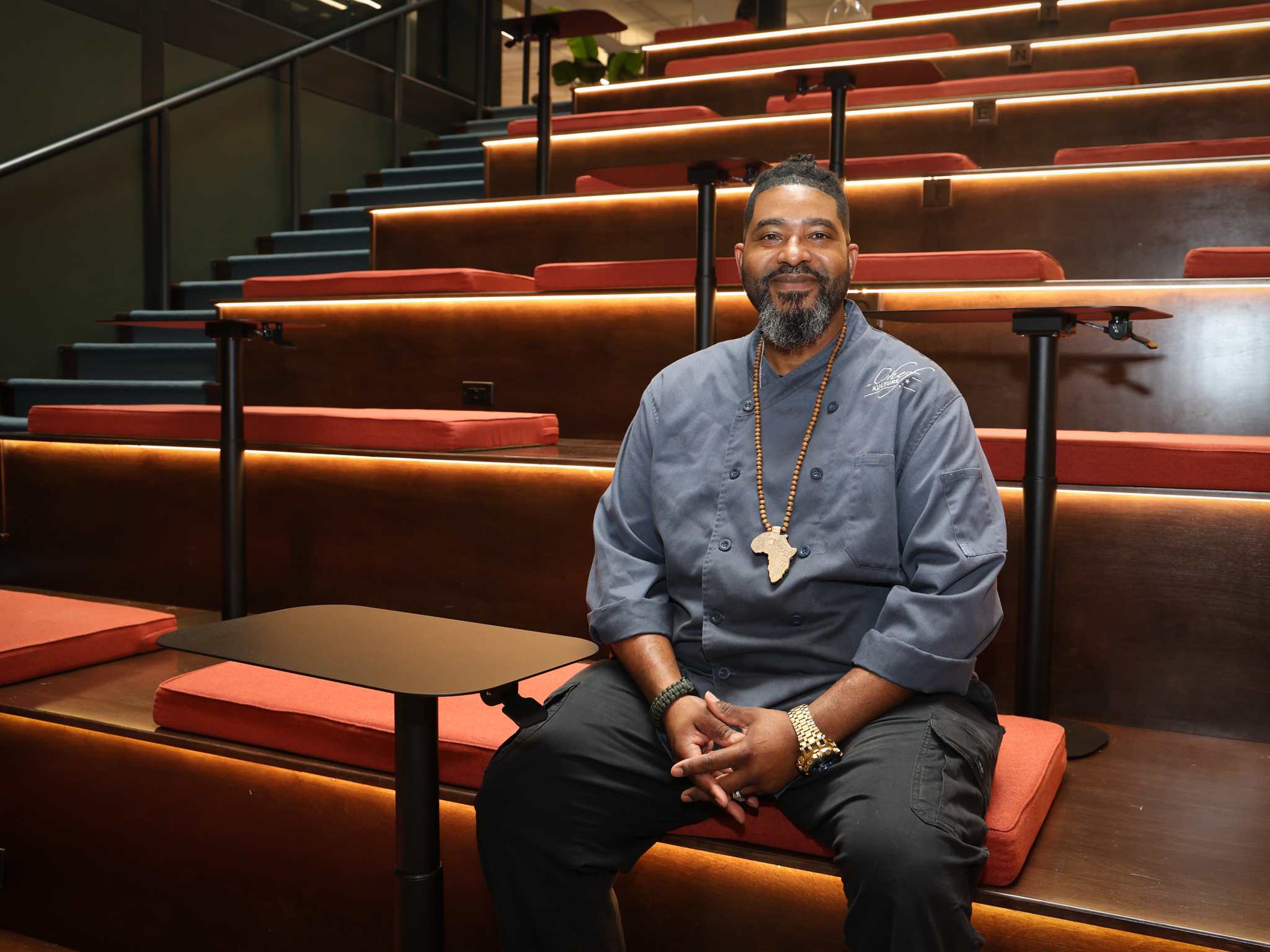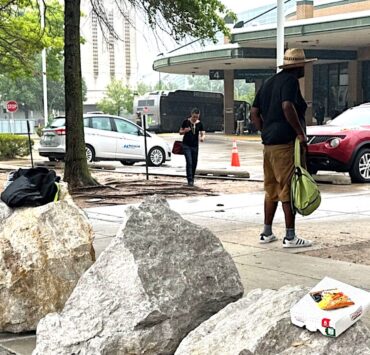
FEATURED
Ross Terrell, The Oklahoma Eagle
Chef Chad Cherry is hosting his four-day event with the historic Greenwood District as the backdrop. Photo: Tim Landes/The Eagle
Picture a scene from FX’s “The Bear” — a high-intensity drama following a chef in Chicago running the family’s sandwich shop. Except there are no flames. No pans and pots. No burn marks or dish-filled sinks.
And, instead of settling fights between colleagues, chef Chad Cherry is at war with the system.
Cherry, who uses the moniker Chef Kulture, has — in some ways — traded the kitchen for the Gradient building, a coworking space in Tulsa’s Arts District. As he walks from one level to the other before settling at his first floor desk, he’s quick to smile and offer conversation to just about anyone he passes.
His professional cooking these days is mostly catering private events like breakfast for Black History Saturdays. Now, he’s firing up an event to create a more connected community among Black chefs.
In 2023, Cherry and his wife Karen Pandy-Cherry, moved to Tulsa after visiting through Breakout, a national networking organization. Much like African Americans in the early 1900s, he, his wife and two of their four kids were lured to Tulsa by potential.
Or perhaps, a dream deferred.
“We fell in love with it and started really understanding the history of Greenwood and the trauma, and we felt that we could make a real serious impact if we were to root here,” Cherry said.
After hosting the State of Black Food in South Florida in 2019, he’s bringing the event to Tulsa for the first time. It’s a four-day conference that will bounce between Gradient and Tulsa’s Greenwood District. He’s calling this year’s experience the Black Wall Street edition. It runs from Aug. 28-31 and is open to anyone who wants to buy a ticket — a one-day pass is $185 but the full experience costs $499 and up.
There will be a welcome reception and red carpet experience, workshops and demos, a black-tie awards gala and a community day that starts with a church service and ends with a barbecue. Tickets are also available for certain individual events.

The current state of Black food
The SOBF’s website emphasizes this ”is not a food festival.” For Cherry, it’s an opportunity to show the Black cooking experience is an art that exists outside of the boxes society has put it in. And that starts with changing the narrative around soul food — a staple in African American lore.
“It’s been bastardized, because we’re chasing their version of success,” he said. “This is what people will come and spend money on if we do it, which means that we can survive … that’s what we’ve been reduced to. We’re doing what we think is going to make us successful.”
To be clear, Cherry isn’t anti-soul food. He just wants chefs he works with to not limit themselves.
“They can just be creative. Food is art,” he said. “Make what you think tastes good. If you’re going to do mac and cheese. Well, can you elevate it?”
The fact that Black people have even been able to reclaim this type of culinary fare is a testament to the community’s resilience.
Quraysh Ali Lansana is the director of the University of Tulsa’s African American Studies program and a well-known cultural commentator on all things Tulsa. He says that creativity can be traced back to the 18th and 19th centuries.
“We think about phrases like ‘eating high on the hog,’” Lansana said. “Understanding that our ancestors, who were enslaved, had to eat low on the hog. So we have turned pig feet and ham hocks and chitlins into a cuisine, into a culinary art based on what our ancestors were allowed to eat.”
Food as a way of life
Even in modern times, food has taken on the role of more than just fuel.
“The dinner table was the first social network,” Cherry said. “You get home, you tune into Facebook and Instagram. Bro, we got around the dinner table. We talked about what happened in the community, what happened at school, what happened with each other? That’s what food does.”
But for the Black community, which experiences higher rates of hypertension and high blood pressure in comparison to their white and Latino peers, Lansana says the concept of Black food is overdue for a reinvention.
“The potential is great to expand how we define Black food, particularly because of health issues and health reasons,” he said. “But also because we’re not monolithic.”
According to 2023 data from the Centers for Disease Control, Oklahoma ranked among the top 10 states for obesity. The highest prevalence is among African Americans.
That’s a personal story for Cherry, who’s now 45. Long before he was Chef Kulture, he was a college kid working at Outback Steakhouse in the early aughts. The “lowest on the totem pole,” as he recalls, but that’s when his education jumpstarted.
He said the food they were cooking was really fresh. They made their own salad dressings and he was introduced to more technical skills, like steak temperature.
Cherry eventually slid into a sales role in corporate America, but not without a cost to his health. He says he ballooned to 350 pounds, spent nearly a month in the hospital and was diagnosed with diabetes.
That’s when his life changed and he started cooking. His flavors mirrored an organic French Caribbean bistro and he opened his own restaurant in Miami. Then he started serving food at polling stations to encourage people to register to vote when former President Obama was running for his first term. He got to meet Barack and Michelle, catapulting him to national recognition.
That’s the momentum he’s hoping to recapture in Greenwood.

From the shores to the plains
Let’s be real: Besides the cost of living, there aren’t too many reasons people (me included) can see for leaving the sunny shores of Florida to live in Oklahoma.
Here’s Cherry’s retelling of his 21-year-old daughter’s reaction: “She was like, ‘What we doing in Oklahoma? I was just in Miami. You got me messed up.’ You know, she’s not really outside, but she was outside enough.”
But history and legacy have a way of outshining beaches and nightlife.
“I didn’t see the destruction of Greenwood and feel anger,” Cherry said. “I saw an opportunity. I saw that we had created true community, true safe space for ourselves and economic viability, the likes that we have not seen anywhere else since.”
Delano Massey has experienced a similar emotion. He’s based in Atlanta and has worked most recently for CNN and Axios. Massey has covered Tulsa’s Race Massacre and similar events throughout his career that’s spanned more than two decades. When he arrives in Tulsa to moderate a couple events for the State of Black Food, it’ll be his first time in the city.
“I think it’s always different when you’re standing on the soil,” he said. “It hit different when I was in Minneapolis after George Floyd and the same when I was in Louisville after Breonna Taylor. Being in the historic district that is Greenwood, it’s sacred ground and I think there is something about walking with the ancestors and what chef Chad is trying to recreate.”
Massey said one of the more important things for the event is “holding the space for Black food, the storytelling and the legacy.”
Preparing for the future
So what about white chefs? They’re invited, too. But Cherry says he’s watching how they present themselves while discussing the state of Black food.
“Can you show up in a space and be an ally for real? Can you show up in a space and not center yourself and your existence?” Cherry pondered. “Can you understand that just because we’re talking to people about their experience, it doesn’t negate your own.”
Cherry said they’re expecting about 100-150 people to attend. He and his wife are mostly funding the event out of pocket. Their biggest sponsor is Walmart and they are also trying to tap into the George Kaiser Family Foundation-funded Tulsa Innovation Labs and Experience Tulsa.
With the Trump administration targeting diversity, equity and inclusion initiatives, Cherry said he was told if he changed the name from State of Black Food, he could attract more funding. But he declined.
Their total budget is about $150,000, which he says is only possible because they’re in Tulsa. This same conference in Miami, he said, would cost them at least $700,000.
When the last plate is served on Aug. 31, Cherry wants people to leave feeling inspired.
“[Greenwood] is not ever gonna be what it was,” he said. “But the mindset, the ability for us to work together to achieve common goals, to build safe spaces, to build true community, that is what we can lock into.”
And ready to conquer.
“The goal is to leave with a plan and enough unity to start to take control of our food industry,” Cherry said. “I might not be able to own s— else in this country, but we can own food and culture.”
Ross Terrell is managing editor of The Oklahoma Eagle. He’s an Atlanta native and, in the spirit of food, loves a good slice of pizza.









